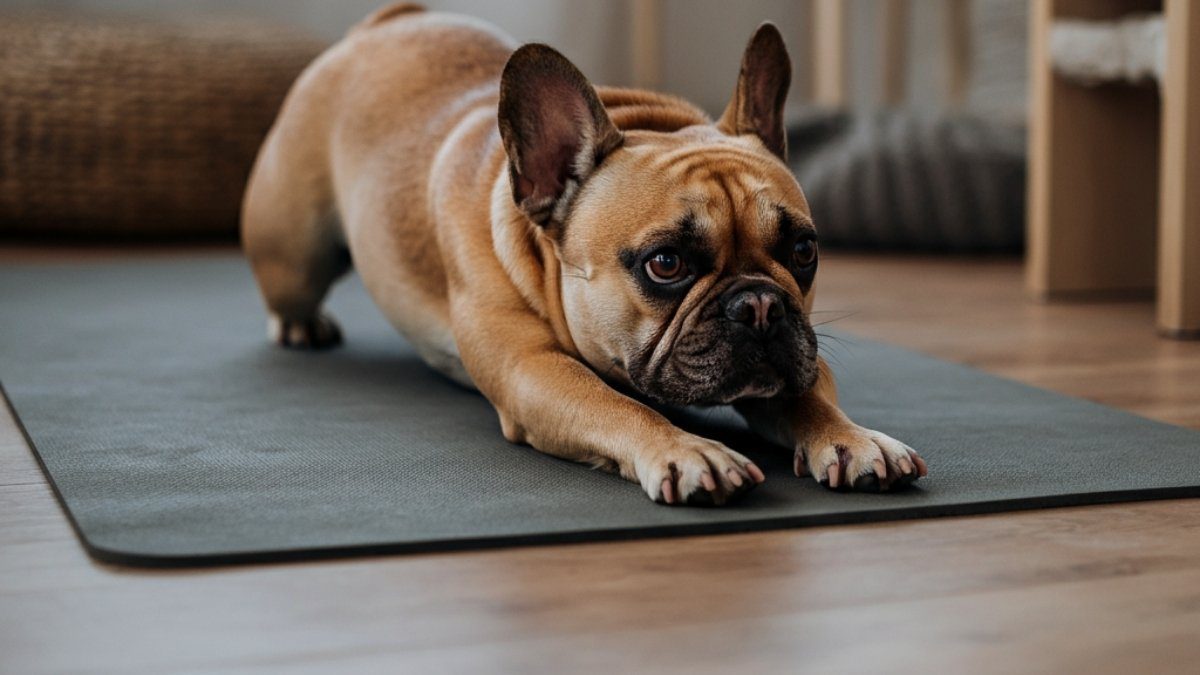How Much Exercise Do French Bulldogs Need? Expert Tip!
If you are thinking about getting a Frenchie, or already have one, you might be wondering how much exercise they really need. These adorable dogs have a unique structure, with a small body, a great personality, and a face that melts hearts. But depending on their lifestyle, age, and health, their exercise routine should be carefully planned.
Unlike high-energy breeds, Frenchies planet revolves around short bursts of activity rather than long-distance runs. Their nose and ears might give them a curious look, but their nature makes them more suited to playful interactions rather than intense workouts. If you want a happy and affectionate companion, focus on adapting their exercise to their context—short walks, light socialising, and plenty of indoor fun with kids. By understanding their factors, you’ll create the best quality time for them while ensuring their health remains a top priority.
Understanding French Bulldogs’ Exercise Needs
Factors Affecting a French Bulldog’s Exercise Requirements
Every French Bulldog has different exercise needs, which depend on their age, weight, health, and energy level. Understanding these factors will help create a suitable routine for their day-to-day activity.
Age
A young French Bulldog is full of energy and requires multiple playtimes to burn off that enthusiasm. As they grow, their physical needs change. Frenchies weighing 15-30 pounds need steady but gradual exercise to prevent injuries. An adult dog thrives on consistent routines, while senior Frenchies may develop issues like joint problems, requiring short yet effective play sessions. If in doubt, always consult veterinarians before adjusting their activity levels.
Weight
Managing a French Bulldog’s weight is essential for their health. An overweight pup has lowered stamina and needs a carefully planned routine to maintain a balanced physical state. Controlling their food intake and incorporating steady exercise can help them shed extra pounds safely. If your Frenchie is struggling, consult a vet to adjust their activity plan.
Health
Some Frenchies face respiratory challenges or other health issues, making gradual movement necessary. Their exercise should always match what they can tolerate to avoid overexertion. Special attention to food intake and routines can prevent them from becoming overweight. If any health concerns arise, always consult veterinarians for the best approach.
Energy Level
Not all Frenchies have the same energy level. Some are naturally more active, while others prefer a slower pace. If a French Bulldog isn’t getting enough exercise, they may develop destructive behaviors due to excess energy. Regular physical activity helps burn that energy and keeps them fit. A structured routine also prevents unwanted habits from forming, ensuring a well-balanced lifestyle.
How Much Exercise Does an Adult French Bulldog Need?
I used to think all dogs were alike when it came to exercise, but my neighbor’s Italian Greyhound changed my perspective. Unlike those sleek, svelte runners, a Frenchie is more stocky and compact, not exactly built for endless running. The sweet spot to keep them healthy, happy, and stimulated is a minimum of 15-30 minutes a day. Some pooches might need double the amount, up to 60 minutes daily, but not all.
Because of their flat faces, Frenchies can have breathing problems, so they do best with short, low-intensity walks. Multiple gentle walks, with plenty of rest in between, work best. Playing indoors also accounts for their activity, so don’t worry if walking isn’t the only way they get their daily exercise.
As a dog ages, the amount of exercise they need will decrease. Every dog is different, and some will keep going while others slow their pace over time. I’ve been warned about older pooches still loving their walkies, even when they should stop. Keep an eye out—if your Frenchie seems stiff, struggling, or trailing behind, start reducing the length of walks to match their comfort level.
How Much Exercise Does a French Bulldog Puppy Need?
Frenchie puppies are little bundles of energy, but their exercise should be limited to avoid joint mobility issues in the long run. A good rule of thumb is 5 minutes per month of age—so a four-month-old Frenchie needs 20 minutes a day. But that doesn’t mean just long walkies.

Most of their time is better spent exploring the world, with short blocks of playtime. Let them sniff new places, experience different environments, and interact safely with new people and animals. Helping them regularly start these habits early is critical for their development.
At around four to six months, their activity level increases. You can add twice-daily 20-30 minutes of structured play and light walks. They love to romp around naturally, so making dedicated playtime part of their routine is important. But don’t forget—puppies need sleep, too!
Detailed Exercise Guide
| Age/Condition | Exercise Time | Activity Type | Notes |
| Adult French Bulldogs | 15-30 minutes daily (some need 60 minutes) | Short, low-intensity walks, indoor play | Avoid overexertion due to breathing problems |
| Older Dogs | Reduced amount based on pace | Shorter walks, gentle movement | Look for stiffness, trailing, struggling as signs to decrease walks |
| Frenchie Puppies (0-4 months) | 5 minutes per month of age | Walkies, exploration, playtime | Focus on new experiences and interactions |
| Frenchie Puppies (4-6 months) | 20-30 minutes twice a day | Romping, sniffing, walkies | Avoid overexercising to prevent joint mobility issues |
Best Types of Exercise for French Bulldogs
Walking and Light Jogging
One of the simplest and most effective ways to keep your French Bulldog active is through walking and jogging. A leisurely stroll around the block keeps them healthy and happy, while a bit of light jogging helps raise their heart rate and burn calories without overworking their low-energy nature.

Playing With or Without a Toy
Playing is a great way to tire a puppy while also keeping them mentally sharp. Whether with a toy or simple interactive games like fetch, hide and seek, or tug of war, these activities provide both physical and mental stimulation. A well-planned play session keeps a Frenchie engaged without pushing them too hard.
Wrestling
Some funny moments happen when a dog at the park finds a puppy to play with. French Bulldogs love to wrestle, whether with their humans or other dogs. This playful body contact mimics how they naturally interact and helps them bond. At home, a gentle wrestle session can tire them in a better way while giving you some quality bonding time.
Indoor Exercises
When it’s rainy or snowy outside, indoor exercises help keep your French Bulldog’s energy levels balanced. Creating a small obstacle course with pillows or playing hide and seek indoors can keep them entertained. If they enjoy tug games, a friendly round of tug of war is perfect for indoor fun.
Training and Mental Stimulation
As mentioned, physical activities aren’t the only way to tire a French Bulldog—mental energy matters too. Short training sessions teaching basic tasks like sitting, lying, staying, or giving a paw provide motivation and prevent boredom. Using treats and praise reinforces everyday rules and makes training feel like a fun daily practice instead of a chore. Even a baby step in learning keeps them from getting bored!
Creating an Effective Exercise Routine for Your Frenchie
For a Frenchie, a consistent but flexible schedule works best. A shorter morning walk of 10-15 minutes and a longer evening walk of 30 minutes help maintain fitness without overexertion. Living in an apartment, I adjust indoor playtime, gentle wrestling, and mental training to keep my dog engaged. A trip to the dog park adds variety and prevents boredom.
To keep things fun, I experiment with new activities while ensuring my Frenchie isn’t left alone too long. The key is to stick to a plan while being adaptable. Devote time wisely, mix different types of activities, and watch your French Bulldog truly enjoy their day.
Signs That Your French Bulldog Needs More Exercise
Weight Gain
I once made the mistake of not giving my French Bulldog enough exercise, and I quickly saw the effects. His weight gain was noticeable, and I learned the hard way that French Bulldogs are prone to obesity. Without regular activity and a healthy diet, they face serious health issues like joint pain, heart disease, and even breathing problems. To maintain his well-being and prevent these problems, I started daily short walks and play sessions. Within weeks, he was healthier and more energetic.
Boredom and Restlessness
When a French Bulldog doesn’t get enough exercise, boredom sets in. I remember how mine became agitated, restless, and started to pace, whine, and even bark excessively when I left him alone. He showed signs of separation anxiety and mild depression. I realized that simply providing physical activity wasn’t enough—he also needed to be mentally stimulated. Interactive toys and training exercises helped prevent this behavior and kept him engaged.

Excessive Chewing or Destructive Behavior
A bored French Bulldog can become a troublemaker. Mine started chewing on furniture and even my favorite shoes! His destructive behavior was his way of saying, “I need more playtime!” I learned that regular exercise could alleviate boredom and prevent these bad habits. Since then, I make sure he gets daily movement and interactive play to keep him satisfied.
Agitation or Hyperactivity
When my French Bulldog had too much excessive energy, he showed signs of agitation and hyperactivity. He became nervous, always pacing, whining, and sometimes even barking excessively out of pure excitement. This overactive behavior wasn’t just him being playful—it was a sign of pent-up stress. I found that a structured exercise routine helped manage his stimulation, calmed his anxious behavior, and reduced his fidgeting. A well-exercised Frenchie is a happy and relaxed one!
Common Exercise Mistakes to Avoid
I still remember the day I took my French Bulldog on a long hike, thinking I was doing something great for him. But by the time we got home, he was exhausted, and I realized I had pushed him too hard. That’s when I truly understood how important it is to balance exercise with their specific needs.
Providing Too Little Exercise
Many Frenchie owners don’t realize how much exercise their pup actually needs. If you don’t provide enough time for walks and play, your Frenchie may become restless and unhealthy. Life gets busy, but skipping their daily activity isn’t an option. The best solution is to ask for support. Whether it’s friends, family members, or even hiring a dog sitter or walker, ensuring your Frenchie gets their movement is important for their well-being.
Over-Exercising Your French Bulldog
On the other hand, over-exercising can be just as harmful. French Bulldogs are prone to injuries and exhaustion, leading to serious health problems if not handled with care. Always follow the recommended guidelines based on their age, weight, and overall condition. It’s important to know when to stop and let them rest.
Exercising in High Temperatures
I learned the hard way that French Bulldogs are extremely sensitive to heat. Exercising in high temperatures is dangerous and can quickly lead to overheating. Avoid walking during the hottest parts of the day, and always provide plenty of water and shade when heading outside. Making small adjustments like these will make sure your pup stays safe.
Neglecting Mental Stimulation
Many think exercise is just physical, but for French Bulldogs, mental stimulation is just as important for keeping them healthy and happy. Engaging their mind through toys, games, activities, and training is essential in addition to physical workouts. Always provide plenty of ways to stay engaged and make sure they don’t get bored.
Ignoring Signs of Fatigue or Discomfort
One of the biggest mistakes is ignoring the signs of pain or discomfort during exercise. If your French Bulldog slows down or seems reluctant, it’s time to stop and take a break. Ignoring these signs could lead to injury or serious health problems. This is even more important for a senior dog, who needs extra attention when showing fatigue. Always take further action if something seems off.
Expert Advice on Exercising French Bulldogs
Advice from the Best French Bulldog Breeders: How Much Exercise Is Enough?
Looking into those eyes, you’d think your Frenchie wants to run all day. But the best way to keep this adorable breed healthy is to understand their limits. Top breeders from Royal Empire say that while these bulldogs love a walk, they don’t need a long one. The right amount of exercise is key. Many new owners get the idea that more activity is better, but too much can be harmful. A few short walks and indoor play sessions will help your little friend stay fit without overdoing it. If your Frenchie gives you that sweetest look, begging for another outing, it’s crucial to know when to stop and let them rest.
/
Understanding the Anatomy of the Breed
French Bulldogs have a brachycephalic structure, meaning their face is flatter with a shorter nose. This makes it harder for them to regulate temperature, especially in warmer climates like Jurupa Valley, California. Experts at Royal Empire stress that these small, AKC-registered dogs are among the healthiest in the breed, but they are still susceptible to breathing issues. Overexertion can put strain on their joints, making exercise uncomfortable. If your bulldog shows symptoms of overheating or fatigue, it’s best to slow down. For older dogs, consider homeopathic remedies and vet guidance to mitigate any risks. Regulating their time outside and understanding how these breeds work is the smartest approach. With the right advice, you can keep them active without pushing them too long.
What Kind of Exercise Is Best for a French Bulldog?
A Frenchie’s lifestyle and temperament make short bursts of activity ideal. Think of morning and evening walks as the bookends of their day, with about 10–15 minutes of movement each time. Playtime is also crucial, but since they spend the majority of their time outside during cooler hours, avoid hot summer months when they can get overheated. Watch for breathing problems, heavy panting, and foamy saliva—all signs they need shade, water, and a cool spot to rest. Instead of long walks, engage them in training exercises. They’re smart and love learning new commands. Games like hide-and-seek or teaching them to crawl keep them active and fun. If you’re new to this, start with simple activities and research ways to gradually increase their endurance. The key is to provide them with enough movement without pouring on too much at once.
Listen to Your Dog and Be Consistent
A consistent routine keeps your Frenchie happy. Short bursts of play and exercise are better than sporadic long walks. Keeping them on a set schedule helps maintains their weight, provides mental stimulation, and lets them release built-up energy. A well-balanced routine ensures they stay healthy and remain a joyful part of your family. Whether you have a puppy or an older dog, professional breeders recommend keeping their activity levels steady to prevent exhaustion.
Conclusion
To wrap things up, finding the right exercise routine for your French Bulldog is all about balance and understanding their unique needs. These adorable companions thrive on tailored activity that suits their energy level, health, and lifestyle. Short walks, playful indoor sessions, and light socialising go a long way in keeping their body and mind healthy, without risking overexertion. Remember, their small structure and flat nose mean neither too much nor too little exercise will do. Keeping an eye on their weight, adapting activities based on their age, and scheduling daily movement ensures your Frenchie stays fit, happy, and ready to snuggle when the day winds down. By creating a routine designed just for them, you’re not only fostering their health but also strengthening the loving bond you share with your sweet, playful Frenchie.
FAQs
Q1. How much exercise does a French Bulldog need daily?
A: French Bulldogs need about 15–30 minutes of exercise daily. This can be broken into short walks, indoor play sessions, or gentle activities that suit their energy levels and health.
Q2. Can I over-exercise my Frenchie?
A: Yes, too much exercise can strain their small structure and cause breathing issues due to their flat nose. Stick to short, low-intensity exercises and watch for signs like heavy panting or fatigue.
Q3. What’s the best type of exercise for French Bulldogs?
A: Short walks, light socialising with other dogs, and indoor activities such as fetch or tug of war are ideal. They also love mentally engaging games like hide-and-seek or learning new commands.
Q4. Do French Bulldogs need outdoor exercise?
A: While outdoor exercise is beneficial, it’s important to avoid exercising in hot weather. Their short nose makes it hard for them to cool down, so prioritize cooler times of the day and ensure access to shade and water.
Q5. How much exercise does a Frenchie puppy need?
A: A Frenchie puppy should get about 5 minutes of exercise per month of age, two or three times a day. Keep activities light and playful to support their growing joints and health.
Q6. How do I know if my Frenchie is getting enough exercise?
A: A well-exercised Frenchie is typically calm and relaxed. Signs they need more activity include restlessness, excessive chewing, or weight gain. If they seem agitated or bored, add more playtime and light activities.
Q7. Can my senior French Bulldog exercise?
A: Absolutely, but keep exercises gentle and shorter, as senior French Bulldogs may have joint or mobility issues. Monitor for signs like stiffness or struggling, and consult your vet for a suitable routine.
Q8. What should I do if my Frenchie gets overheated during exercise?
A: Move them to a shaded area immediately, provide water, and pour cool water over them. Watch for signs like foamy saliva or breathing problems, and reduce outdoor time during hot months.
Q9. Do French Bulldogs need mental stimulation too?
A: Yes! Alongside physical activities, mental exercises like training, puzzle toys, or learning commands are great for their overall well-being.
Q10. Can French Bulldogs play with kids as part of their exercise routine?
A: Yes, supervised play with children is a wonderful way to keep a Frenchie active. Their affectionate nature and playful personality make them great companions for fun and gentle activities.


